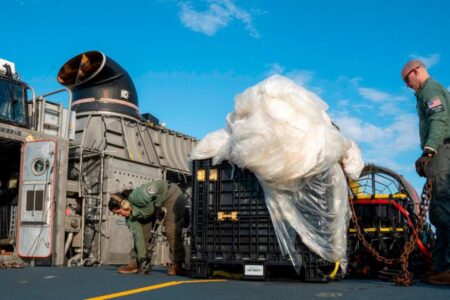China refuses to allow US Secretary of State Antony Blinken to visit Beijing over fears that the FBI will release the results of the investigation into a suspected downed Chinese spy balloon.
China has told the United States it is not willing to reschedule the trip that Blinken canceled in February, said four people familiar with the negotiations, while it remains unclear what President Joe Biden’s administration will make of the report.
The FBI has been analyzing debris recovered from the balloon since it was shot down in February. The US says the craft was spying on sensitive military sites, but China says it was a weather balloon that was derailed by the weather.
Chinese officials are concerned that the Biden administration may release the FBI report along with physical evidence from the balloon, and that its findings may be made public during Blinken’s trip to China.
Chinese Foreign Minister Qin Gang raised the issue with the Americans who attended a China Development Forum in Beijing last month, three people familiar with the meeting said.
Chen called the FBI investigation another example of issues that have made it difficult to stabilize relations between the United States and China, one of the people said. US officials confirmed that the crisis was sparked by China’s balloon flight through the country’s airspace.
The FBI and the National Security Council declined to say whether the investigation would be made public.
The issue has also sparked divisions within the Biden administration, with some officials wanting publicly released evidence to show Balloon was conducting surveillance declassified. Congress is also likely to push for the FBI’s findings to be released.
But others say releasing the information will hamper efforts to restart much-needed high-level engagement between the two countries at a time when US-China relations are at their lowest point since the two countries established diplomatic relations in 1979.
Blinken was supposed to meet President Xi Jinping in China in February, but he abruptly canceled his trip because of the balloon.
Bonnie Glaser, a China expert at the German Marshall Fund, said Beijing’s stance reflected its concerns about how the US could continue to use the ring.
“Beijing does not trust the intentions of the United States and fears that the United States will use the information gleaned from the balloon investigation in ways that harm Chinese interests,” Glaser said.
Dennis Wilder, a former adviser to George W. Bush on Asia, said there is a “good chance” that Beijing will not give the green light while uncertainty about the FBI report remains.
“In many ways, we are more eager for this visit than they are now,” he said. They have no incentive to make the visit quickly. In this sense, for the Chinese, the downsides of waiting are not great.
Several people familiar with the situation said China was also reluctant to agree to Blinken’s visit out of frustration that US lawmakers, including House Speaker Kevin McCarthy, met with Taiwanese President Tsai Ing-wen this month.
The Chinese embassy in Washington said Beijing “firmly opposes the United States’ continued use of the (balloon) incident for political purposes and exaggeration of the ‘Chinese threat’.”
A spokesman for Liu Bingyu said that China “can only seriously question the independence, openness and transparency of the so-called investigation”. He said both countries have an obligation to “calmly and wisely handle some unexpected situations” after Xi and Biden agreed on the importance of maintaining communication at all levels.
While the two sides failed to reach an agreement regarding Blinken’s visit, there was some engagement. Rick Waters, a senior official of the Chinese Ministry of Foreign Affairs, recently visited Beijing and Cui Tiankai, former Chinese ambassador to the United States, visited Washington.
However, in other areas, there was almost no participation. Michael Chase, the top Chinese official at the Pentagon, has not been able to meet with his Chinese counterpart in Washington since he visited Taiwan in February, the second visit to the island by a senior defense official in four decades.
“China continues to deny requests to communicate with the Secretary of Defense, the Chairman of the Joint Chiefs of Staff, (Commander of the Indo-Pacific) Admiral (John) Aquilino, and other senior DoD officials,” said Martin Meiners, of the Pentagon. official speaker.
Asked by the Financial Times this week about his travel plans, Blinken said it was “important to maintain channels of communication” with China to make sure both sides “talk to each other clearly”.
“When it comes to my visit to China, when the conditions are right, I certainly look forward to following through,” the senior US diplomat added.
He follows Demetrius of Sevastopol on Twitter
